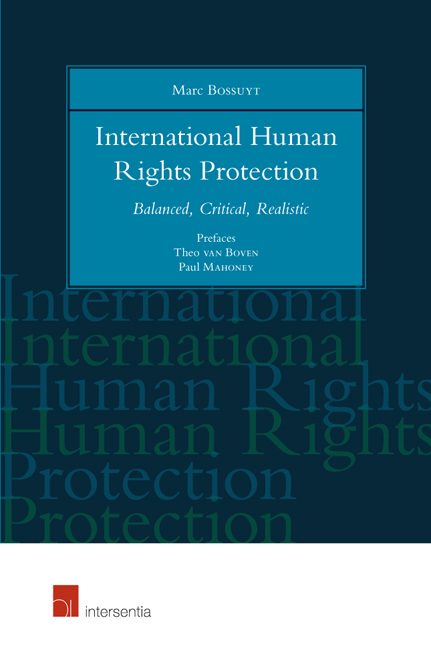Book contents
- Frontmatter
- Dedication
- Preface: A Lifetime of Fidelity and Participation
- Preface: A Penetrating and Salutary Analysis of the European System of Human Rights Protection
- Introduction
- Contents
- Epigraph
- PART ONE International Protection of Human Rights in General
- A The Normative Framework
- B The Institutional Framework
- Chapter V The UN Charter-Based Human Rights Bodies
- Chapter VI The UN Human Rights Treaty Bodies
- Chapter VII Regional Systems of Protection of Human Rights
- PART TWO Specific Human Rights Protection
- Annex: At the Crossroads of Law and Politics
- Bibliographies
- About the Author
Chapter VI - The UN Human Rights Treaty Bodies
from B - The Institutional Framework
Published online by Cambridge University Press: 25 September 2018
- Frontmatter
- Dedication
- Preface: A Lifetime of Fidelity and Participation
- Preface: A Penetrating and Salutary Analysis of the European System of Human Rights Protection
- Introduction
- Contents
- Epigraph
- PART ONE International Protection of Human Rights in General
- A The Normative Framework
- B The Institutional Framework
- Chapter V The UN Charter-Based Human Rights Bodies
- Chapter VI The UN Human Rights Treaty Bodies
- Chapter VII Regional Systems of Protection of Human Rights
- PART TWO Specific Human Rights Protection
- Annex: At the Crossroads of Law and Politics
- Bibliographies
- About the Author
Summary
The Charter of the Organisation of the United Nations, adopted on 26 June 1945, contains a number of provisions referring to human rights. Most important are Articles 55 and 56, which constitute the basis of the international law obligation to respect human rights and fundamental freedoms. According to those articles, all Members pledge themselves to take joint and separate action in co-operation with the Organisation for the achievement of “universal respect for, and observance of, human rights and fundamental freedoms for all without distinction as to race, sex, language, or religion”. Presently, 193 States, nearly all the sovereign States, are Members of the United Nations and did, by becoming Members, accept the obligations of the UN Charter. The obligation, enshrined in that Charter, to respect human rights and fundamental freedoms was, however, weakened by the absence of an enumeration and of a definition of those rights and freedoms. That obligation has been clarified by the adoption of various instruments for the protection of human rights.
The first task of the Commission on Human Rights was the elaboration of an Universal Declaration of Human Rights, adopted in Paris by the General Assembly in its resolution 217 A (III) of 10 December 1948. While providing an interpretation of the obligation to respect human rights taken up by the Members of the United Nations, the Universal Declaration, which is a recommendation of the General Assembly, does not have as such binding legal force and does not establish an international supervisory mechanism of that obligation.
That is why the Commission on Human Rights has pursued its endeavours by elaborating draft international human rights conventions, the legally binding character of which would be beyond dispute for all States becoming parties to it. Those draft s were adopted by the Commission on Human Rights on 16 April 1954 and forwarded to the Third Committee of the General Assembly. It took no less than twelve years before the General Assembly adopted on 16 December 1966, in its resolution 2200 A (XXI), the International Covenants on Human Rights and the (First) Optional Protocol to the International Covenant on Civil and Political Rights.
- Type
- Chapter
- Information
- International Human Rights ProtectionBalanced, Critical, Realistic, pp. 67 - 76Publisher: IntersentiaPrint publication year: 2016



